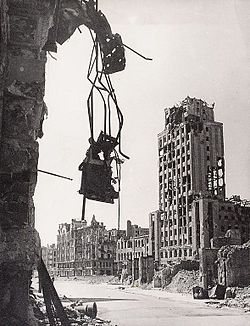From Wikipedia, the free encyclopedia
"Conflict zone" redirects here. For the 2001 video game, see Conflict Zone.

The War by Tadeusz Cyprian (1949), a photograph in the collection of the National Museum in Warsaw showing ruins of Warsaw's Napoleon Square in the aftermath of World War II.
| Part of a series about |
| War |
|---|
|
|
|
|
|
|
|
|
|
|
|
|
|
|
|
|
|
|
|
|
|
|
|
|
War is a state of armed conflict between societies. It is generally characterized by extreme collective aggression, destruction, and usually high mortality. The set of techniques and actions used to conduct war is known aswarfare. An absence of war is usually called "peace". Total war is warfare that is not restricted to purely legitimate military targets, and can result in massive civilian or other non-combatant casualties.
While some scholars see war as a universal and ancestral aspect of human nature,[1] others argue that it is only a result of specific socio-cultural or ecological circumstances.[2]
In 2013 war resulted in 31,000 deaths down from 72,000 deaths in 1990.[3] The deadliest war in history, in terms of the cumulative number of deaths since its start, is the Second World War, from 1939 to 1945, with 60–85 million deaths, followed by the Mongol conquests[4] which was greater than 41 million.[5] Proportionally speaking, the most destructive war in modern history is the War of the Triple Alliance, which took the lives of over 60% of Paraguay's population, according to Steven Pinker. In 2003, Richard Smalley identified war as the sixth (of ten) biggest problem facing humanity for the next fifty years.[6] War usually results in significant deterioration of infrastructure and the ecosystem, a decrease in social spending, famine, large-scale emigration from the war zone, and often the mistreatment of prisoners of war or civilians.[7][8][9] Another byproduct of some wars is the prevalence of propaganda by some or all parties in the conflict,[10] and increased revenues by weapons manufacturers.[11]











